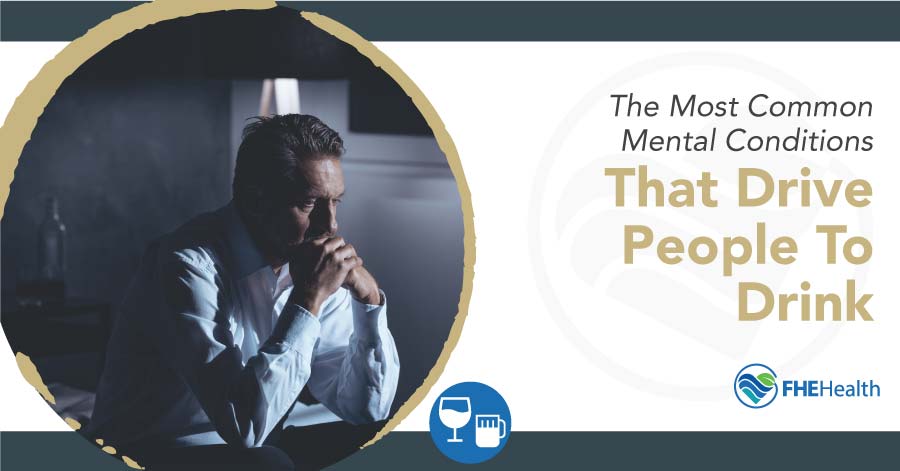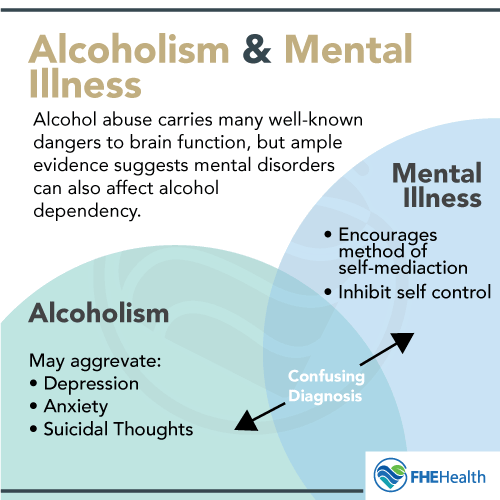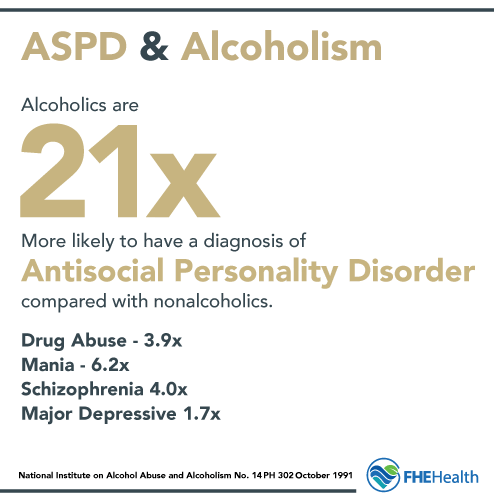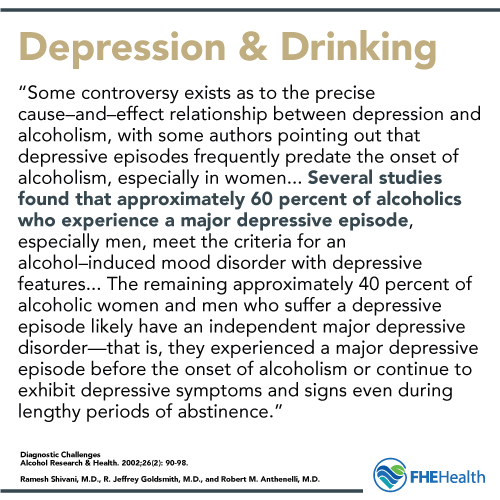
Do You Suspect That Your Drinking is Due to an Unknown Mental Disorder?
If so, you may be one of many Americans whose alcohol abuse is linked with mental illness. The comorbidity of alcohol and antisocial personality disorder (ASPD), bipolar disorder, depression, and several other conditions increases the risk of receiving a partial diagnosis or perhaps an incorrect one altogether.
At FHE Health, we’re committed to treating the full range of illnesses and getting patients back to long-term health, whether their struggles began or worsened when they drink alcohol. Our treatment program is designed to support the physical and mental health of those suffering beyond their mental illness.
Alcoholism and Mental Illness
 Alcohol addiction is difficult to cope with on its own. However, it may be driven by a host of other health problems, including mental illness. This combination presents a diagnostic challenge even to well-trained clinicians who deal with a wide spectrum of cases.
Alcohol addiction is difficult to cope with on its own. However, it may be driven by a host of other health problems, including mental illness. This combination presents a diagnostic challenge even to well-trained clinicians who deal with a wide spectrum of cases.
Alcohol abuse carries many well-known dangers to brain function, but ample evidence suggests mental health conditions can also affect alcohol dependency. Sadly, people suffering from both rarely receive complete treatment. Some fear the stigma of having a mental illness, or they may not even know they’re ill. On top of this, alcoholism is stigmatized in many social circles and among family members and friends.
Moreover, the self-reinforcing spiral of addiction resists traditional treatment methods, and comprehensive treatments aren’t as widely available, even though pharmaceutical and psychotherapy solutions are compatible. For individuals struggling to pin their illness on a single cause, exploring a dual diagnosis could be the key to moving forward.
Traditional treatment programs infrequently employ drugs and psychotherapy together, but even when they do, such programs operate independently of each other. For individuals with comorbid alcoholism and mental health disorders, this type of care usually isn’t enough.
The Strong Comorbidity of ASPD and Alcoholism
 ASPD is a mental disorder characterized by antagonistic behavior, reckless lack of concern for negative consequences and indifference to right and wrong. Individuals with this condition typically display behaviors such as:
ASPD is a mental disorder characterized by antagonistic behavior, reckless lack of concern for negative consequences and indifference to right and wrong. Individuals with this condition typically display behaviors such as:
- Disregard for right and wrong, including the law
- Impulsiveness and lack of future planning
- Irritability, aggression, violence and willingness to hurt others without remorse
- Indifference to negative consequences to self and others
Alcoholism is linked to ASPD more strongly than any other disorder, but the overlap between the two can make accurate diagnosis complicated. Antisocial behavior increases the likelihood of substance abuse; drinking lowers inhibition and lowers the threshold for antisocial behavior. Both tend to be reported in adulthood.
For these reasons, establishing a patient’s medical history is critical. Those with comorbid ASPD display earlier onset alcohol abuse. In addition, alcohol-dependent men are four to eight times more likely to exhibit comorbid ASPD, and alcohol-dependent women are 12 to 17 times more likely.
When either a patient or medical professional isn’t equipped with the right information, the result is focusing too much attention on the immediate problem. With a condition like ASPD, attempting to treat alcoholism alone may not be effective.
Bipolar Disorder and Booze
Bipolar disorder, also known as mania or manic-depressive illness, is a mental condition causing mood swings between extreme high — mania or hypomania — and low episodes. The varying moods have separate symptoms, but a diagnosis requires a cluster to be accurate.
These are some of the most recognizable symptoms:
Highs
- Racing thoughts
- Sudden proneness to distraction
- Poor decision-making
- Lack of sleep
Lows
- Fatigue
- Restlessness
- Impaired concentration
- Unnecessary guilt and feelings of worthlessness
Bipolarity has the second strongest link to alcohol dependence. About 50-60 percent of manic patients abuse alcohol and other drugs at some point. Separating the illness from drinking habits can be especially difficult. Because most of the data is self-reported, it’s vulnerable to limitations such as underreporting and complex mood changes, which may be affected by other drugs and medical conditions.
As with ASPD, pinpointing alcohol abuse in a bipolar individual’s timeline may be a considerable piece of the puzzle. Comorbidity of alcoholism and bipolar disorder has a significant tell: the majority of those with both disorders seek help from AODS (alcohol and other drug services) before experiencing affective episodes. Medical professionals should collaborate with patients to ensure their medical histories are correct; in doing so, they might find opportunities to intervene before a downward spiral begins.
Depression and Drinking
 Depression is a mood disorder resulting in lack of motivation and long durations of persistent sadness. Clinically depressed individuals often display these symptoms:
Depression is a mood disorder resulting in lack of motivation and long durations of persistent sadness. Clinically depressed individuals often display these symptoms:
- Feelings of deep sadness, hopelessness and emptiness
- Extreme lethargy and lack of energy
- Abnormally reduced or increased appetite, leading to weight problems
- Suicidal ideation and dark thoughts
- Disinterest in normal activities, include previous hobbies and interest
While a clinically depressed person doesn’t necessarily become an alcoholic, alcohol and depression are linked; more than 80 percent of alcoholics have psychiatric complaints at some point. The depressive effects of alcohol itself can account for many of these complaints, and there may be no underlying condition.
However, when mood changes are restricted to clinical criteria, like those of a major depressive episode, it paints a bleak picture. Approximately 30-40 percent of alcoholics show comorbidity of alcoholism and depression.
The relationship isn’t strictly causal. Several studies found that 40 percent of alcoholic men and women likely have an independent major depressive order, meaning a depressive episode predated alcohol use and their symptoms continue with or without drinking. But even when not the cause, depression can contribute heavily to substance abuse, leading to a cycle of desperate drinking that worsens an individual’s mental state.
What Are Other Disorders Affected by Alcoholism?
Alcohol’s impact on the brain generally affects psychiatric disorders. Several other mental illnesses, including anxiety disorders and schizophrenia, are also comorbid with alcoholism.
Schizophrenia is a devastating disorder itself, but it’s frequently complicated by comorbid conditions. The most common of these is alcohol use disorder (AUD). While schizophrenic individuals turn to alcohol abuse for various reasons, self-medication is one of the most prominent.
Anxiety disorders share a similar profile, with alcohol being used to relieve panic and anxiety attacks. A small difference arises in the rate of dependency; the more alcohol an anxious person consumes to soothe the anxiety, the greater the quantity required to withstand anxiety symptoms. They may also avoid treatment, fearing social interaction and confrontation.
The complexity of these illnesses makes them perfect candidates for integrated treatments because they often resist drugs or cognitive behavioral therapy (CBT) individually.
Drinking and Mental Health – How FHE Can Help
The only proper way to diagnose and treat both is often a residential treatment center where they both are treated. Contact us today by calling us at (833) 596-3502. We have compassionate counselors ready to take your call 24/7. Begin your journey to recovery.






